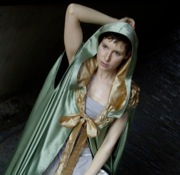Who Walks is multi-media dance and theater collaborative performance.
Who Walks is a continuation of AJ Sabatini’s 2008 play, Certain Explanations: Magical Walking (premiered at ASU's Second Stage West). In Magical Walking, a solo actor relates his encounters with a woman obsessed with magic and walking. She has problems with remembering, explanations and certainty (or, just Wittgenstein’s ideas). Who Walks takes up the story in dance, music, conversation and video. A mysterious woman in a cape, who resembles an ancient statue, moves in the thoughts of a man writing at a desk, crowds appear and walk as if in a memory coming alive. The woman and man have odd, intimate conversations about walking and alphabets. love and dance. Music surrounds them. The woman and the crowds dance and the man and woman try to understand what they see and what is happening around them. Music, soundscapes and images on film and video screens underscore the perplexity of being certain, or grasping explanations. Characters and images from Magical Walking appear as traces of this encounter.
Who Walks will be the result a collaboration that included a week long residency with composer Peter Price and dancer Megan Bridge and Robert Kilman, with performers from ASU's IAP Program.
Who
WHO WALKS
A Collaboration: Conceived and written by AJ Sabatini
with <fidget>: Peter Price, Sound and Music
Megan Bridge, choreography and dance
Robert Kilman, video
AJ Sabatini, text and voice
Charles St. Clair, lighting
Performers: Janae Myles, Janine Barbour, Kil Kim, Kimberly Loehr, Joseph McGee, Heather Moses, Anthony Roush, Andy Santos
Second Stage West
Saturday March, 2011 7:30
Phoenix, AZ 85069
Arizona State University
(Megan Bridge)
on "W"
Speaking the letter "W" in English requires three syllables. Also, saying 'double-you' is bothersome and unfair to the other letters of the alphabet. I am proposing that wah, wuh, wew, weh, wh, wi, wo wh, wih would do just as well. Try it. The end of your alphabet would be a nifty: yoo, vee, wih, why, zee. (My alphabet is different, but that would take a long time to explain.)
More annoyance abounds in always speaking one of the most common signs of our moment: 'double-yoo, double-yoo, double-you.' Nine syllables! What a waste o' wind. In some languages, Dutch, for example, "W" is pronounced "weh," making that Internet thing, weh weh, weh for them. (I like to think every speaker places a beat or accent on one or another weh). Were we to "W" as a simple "whe," spelling out "whew" and "wow" would take no time and be more pleasant to the ear.)
Oh yes, Wittgenstein, who is a voice in the production, begins with "W," which is pronounced as "V" in German. His ideas and use of language intrigue and amaze me. No doubt, he would find this entire project to be nonsense.





